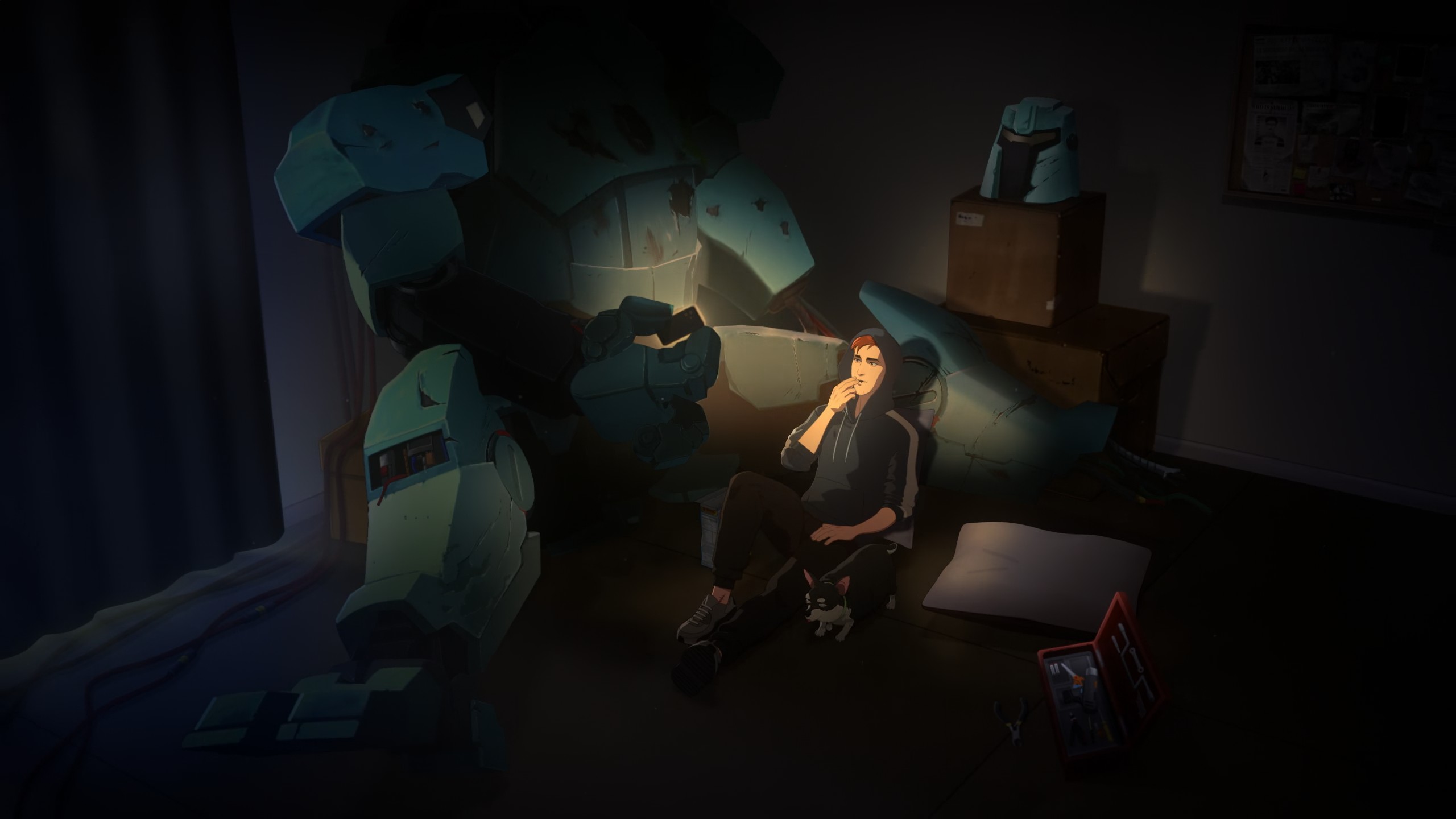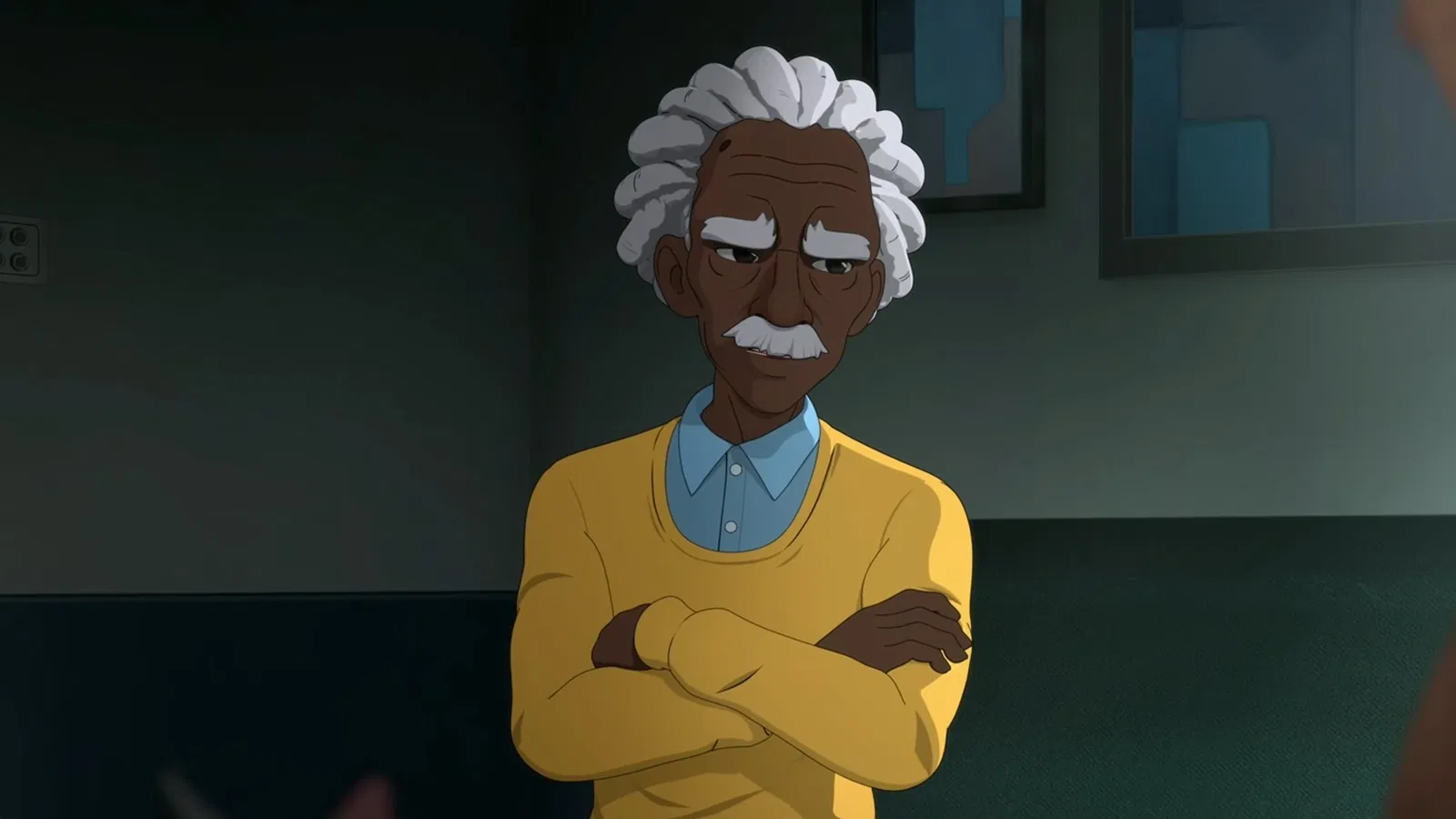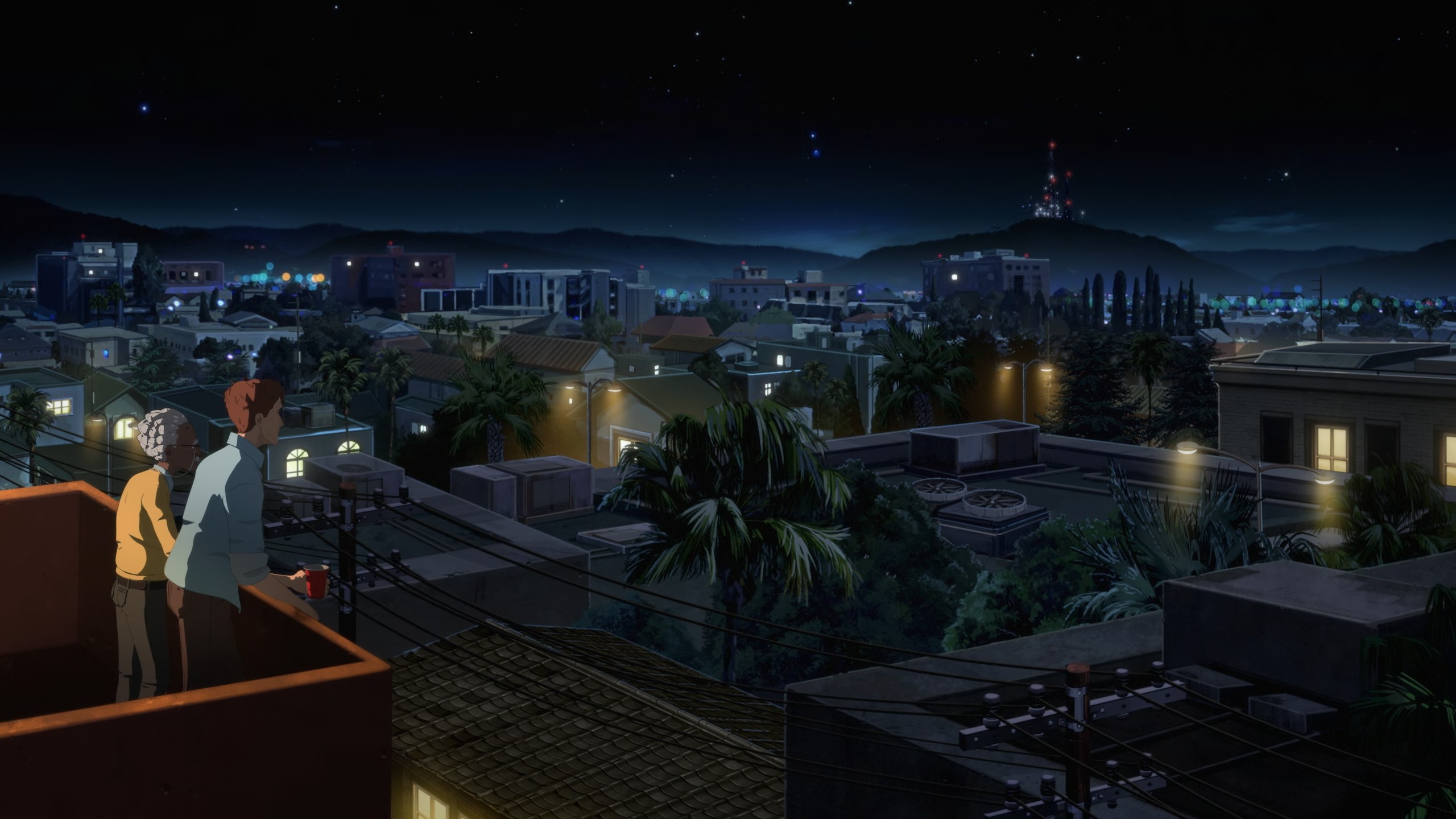Dispatch, and the Decade Long Voyage
November 20th, 2025

What you mean this is Robert's low point, bro's room looking like an Armmored Core garage, that's awesome!
Anyway let’s cut to the Chase
I am not funny
Telltale’s final years were ones of deflation, an unnerving death march that
started the moment the realization the golden goose had run its course and
nothing could be done about it. The studio had found comfort in passivity,
an irony more would have found funny if they weren’t fed up by that point; a
one-trick pony can only go so far if sometimes the pony fucks up the trick
completely to begin with, which in Telltale’s terms means having not-so good
writting. Even if they nailed the fall every time, the writing was on the
wall; the studio’s mantra of property adaptation through re-invention was
always gonna break someone’s back when they themselves struggled with that
same process, the loop of decisions and sparse interaction feeling tired at
best and actively clunky at worst.
The Walking Dead’s S1 is consistently praised as their first real
go at the interactive series specialty, and a sound one at that, which makes
the fact Jurassic Park: The Game came out just before it like some
sort of unknown herald of darkness from before the days of oversaturation:
sloppy, narratively confused, riddled with bugs and fail states except when
it decides that ‘’no you missing this quick time event matters this time
actually’’. The result of a group of creatives grappling with newborn ideas
that will later solidify till the point of calcification… and also the first
Telltale game I ever interacted with.
Passive enjoyment feels like a pretty big and pedantic term when talking a
dinosaur loving kid watching his dad play through the new Jurassic Park game
and getting mesmerized at the movie-like aspect of it all, as if an
animation series was happening before his very ass while his dad made
decisions that seemed grander that life, and sometimes he’d even ask you to
pick one. That kid was me, and as long as I was there, watching that thing
that wasn’t quite a game or a series, the illusion was real, and that was
Telltale’s stronghold. Even as a participant that barely interacted with the
experience ( a role in cases filled by the one who watches AND the one who
plays), the façade was difficult to not fall for; at its best, Telltale
Games knew how to give even the most inconsequential, completely useless
decision some heaviness in the moment-to-moment. Some would call it
deception, but I prefer the term grace.
In many ways, Dispatch isn’t too different. In others, it’s the
culmination of every single dev and creative that made the past studio’s
outings possible bringing their A game, and then some.
For games that ultimately played themselves, Telltale’s games were somewhat
characterized by its jagged animations and stilted movements, a necessity to
combat the madness going on in the backdrop. I cannot even conceive the kind
of scripting madness making one of these things must be; even when all
decisions lead to the same outcome, you gotta make sure every scene leads
into one another as seamlessly as possible, nevermind the decisions that
do alter the whole game or may have ripple events felt as
things begin to wrap up, and if you fail that, you lose the entire
suspension of disbelief, the illusion broken. Dispatch makes it
looks like child’s play.
The animation and scripting are beyond unreal, a perfection of motion that
nearly borders on wizardry: the flow and timings are all pitch perfect, the
pauses and conversations flowing with a naturality that smoothes out its own
rough edges, interruptions or interjections that connect with no jittering
and sometimes even REACT to a phrase a character was already saying, which
cannot happen entirely if you press the decision before they start talking
or after. On a plotline (plotgraph? plotdiagram?) that has to juggle between
8 different major decisions at all times while making sure all make sense
and feel satisfying as the story plays out it MAD impressive, that alone
would have made it the most ambitious game of its ilk, but the superb art
design and real time movement carry it a step BEYOND.
*Dispatch* isn’t playing on the same level of impressiveness that CRPGs or
Immerssive Sims do, and that comparison definitely hurts it more than
anything, but I don’t think it’s a fair one to begin with… but if its only
objective was to be another attempt at the interactive-TV series concept, I
wouldn't be praising it as much.
But it all leads to the dispatch system.
Don’t talk to me while I’m on the cabin, Coupe’s is off the shits, Golem is
drunk, and I’m maxing the fuck out of Puch Up’s stats; dispatching is a
fairly simple and autonomous system, and it makes a strength out of it. It’s
a pseudo strategy game entirely based on resource and stat management with a
whole life breathed into it, each mission is giving its own characters, its
own text and explanations, some which can even spiral into further missions
that connect back to it and have a whole mini-villain which you can decide
to play along with or deal with on your terms. In later episodes, and
SPECIALLY at the finally, there’s barely any time to take a rest; you are
constantly having to jump between Z Team members, searching whenevers
synergies you can find or sending it and throwing a tank character to a
charisma mission, while others to which you sent four different heroes turn
out to have been instantly solvable if you sent one, so you gotta spend that
coffee and it HURTS, and I LOVE IT. Even the fucking hacking minigame is
good, doubly so when it’s an optional path you can take within a mission
instead of asking a group of heroes that may or may nor have the stats to
deal with a problem head on.The active moments that in another context where
relegated to quick time events are now almost entirely centralized on here,
and it **works**, I love this system, and every fuck up hurts on a personal
level, despite the fact you are merely looking at a work screen with
portraits day after day.
And YET, if it was only that, I still don’t think it would have felt enough.
What seals the deal then, is this lovable bunch of very stupid people.
In this lovable turd of a world
The snarks and quips during missions had me rolling my eyes so much they
made a whole loop and it began to grow on me; every character already has
pretty good distinctions and abilities that fill very specific roles and
niches, but the interactions between all the members are the main reason
dispatching works. Some will get depressed or low on morale depending if a
mission goes wrong or after you take a certain choice, some will jump on a
mission or reject going to another and COMPLETELY fuck up your planning. One
day they screw each other up so they don’t get last place, while on another
you’ll have to send someone to go get another because they got hammered,
events that, by all accounts, are annoyances… but they are special
annoyances. They happen not because of luck, even if they absolutely do, but
because of the kind of people your team members are: every line and special
event is contextualized and elevated, and that’s why it hurts so much to
fail them and to see them fail you, and it makes you jump to the heavens
when they clutch up and make amends, and those feelings translate back to
the off-shift segments.
This ain’t even mentioning the two biggest choices in the entire game on a
playable level, that even episode’s 3 and 4 who to cut and who to add
decisions. These two alone would make a replay more than warranted, but the
first time experience of getting to make them and seeing their consequences
is top notch stuff, a gut punch and a warm hug that feel perfectly timed,
with no real ‘’wrong’’ answer. With all that said I adore Phenomaman’s
route, barely anything may change on a narrative level but the scenes with
him are both incredibly funny and sweet to infinity and beyond. That hug on
episode 6’s party healed me and the fact the ability of one of the strongest
characters in the game is getting sad and a handicap actually is genius,
Slaking Truant type shit and I love that. Bottom line is this game has the
guts to inconvenience you over and over and I LOVE it for
it.
The fact decisions hold more immediate weight is a huge plus, an obvious one
in some ways, but the result of pairing that illusion with actual meat and
playable friction gos boundaries more than being a simple spectator could
ever achieve… and also not enough time to fully realize its potential.
I don’t think the fact Dispatch’s narrative has clicked immediately
with many is an accident; it’s not gonna be everyone's predilection in
story-telling, and I for one am only willing to overlook some of its aspects
and lack of thematic exploration —very weird and at times gross how the
corporatization of supers and social dynamics are so overlooked or
‘’wholesome-ized’’ imo— so far, but when such an interesting premise is
paired with this strong of a character roster, there’s no much space to
wonder. I’ve praised the Z team, but everyone on the office should be of
equal worth to mention. Chase is my goddam GOAT and the actual character
moments in the downtime are so strong, so touching at times, I don’t think
many would have complained if the game was only composed by them. Things
like the party scene in episode 6, the aftermath of the bar fight or the
progression of meeting room scenes are perfect studies of character
interaction, lil’ steps that make a fist bump carry the power of an entire
story, the kinds of absurdity and sweet hugs that make dick jokes actually
endearing somewhatkinda. Invisigal’s arc is, in plenty of ways, ground that
has been more treaded than an abandoned backyard, and yet I wouldn’t call
any of the scenes with her anything that didn’t include the word
‘’delight’’.
That is why I wished it had more time, to the point I’m baffled
this didn’t have another batch of episodes before the finale; the villains
end up getting the VERY short end of the stick, Shroud specially bearing a
really cool design and excellent mech, but acting more of a roadblock than
an actual interesting thread, and the reason why I don’t seem to be the only
one that thinks Chapter 8 flounders a bit isn’t only because of that. So
much is resolved or brought to the table that not even the context of a
missed route can even fill that void; Invisigal’s resolution, while
compelling while way or another, has so much to take into account that the
lead up to it feels very, VERY strange, not to mention the rest of the main
cast besides Chase and Blonde Blazer (and maybe Royd) get kinda shafted and
thrown to the side. Sonar/Coupé get more compelling stuff than Prism, which
was the hero I deployed the most by a WIDE margin, which feels like a
mistake, and despite all of these being problems that’d get solved with more
time or a continuation… The idea of a season 2 doesn’t necessarily thrill
me.
Robert and the Z team’s story isn’t one you can continue in the same ways of
old; Telltale’s seasons were emblematic of its rot, and now that the people
behind it are born anew, rising and bringing new, exciting ideas, to plum
again to the expected golden goose wouldn't be ideal. They don’t have
something perfect, but they have something wonderful, something I do not
wish to get tired of again.
Right now, it’s hard to feel grumpy; season 2 is on the cards, but only if
it carries something worth exploring and more out there, and that thrill to
not just keep pressing the play button, but actively make stuff that can
surpass what *Dispatch* just set up for these people… that is what excites
me.
That is what makes a kid watching a JP game’s illusion real.
My biggest thanks to Jason, aka Blazing Waters, for gifting me the game's copy and making this review even possible, and be sure to check out his website!: Jason's Export Feed
Thank you so much for reaching this point.

